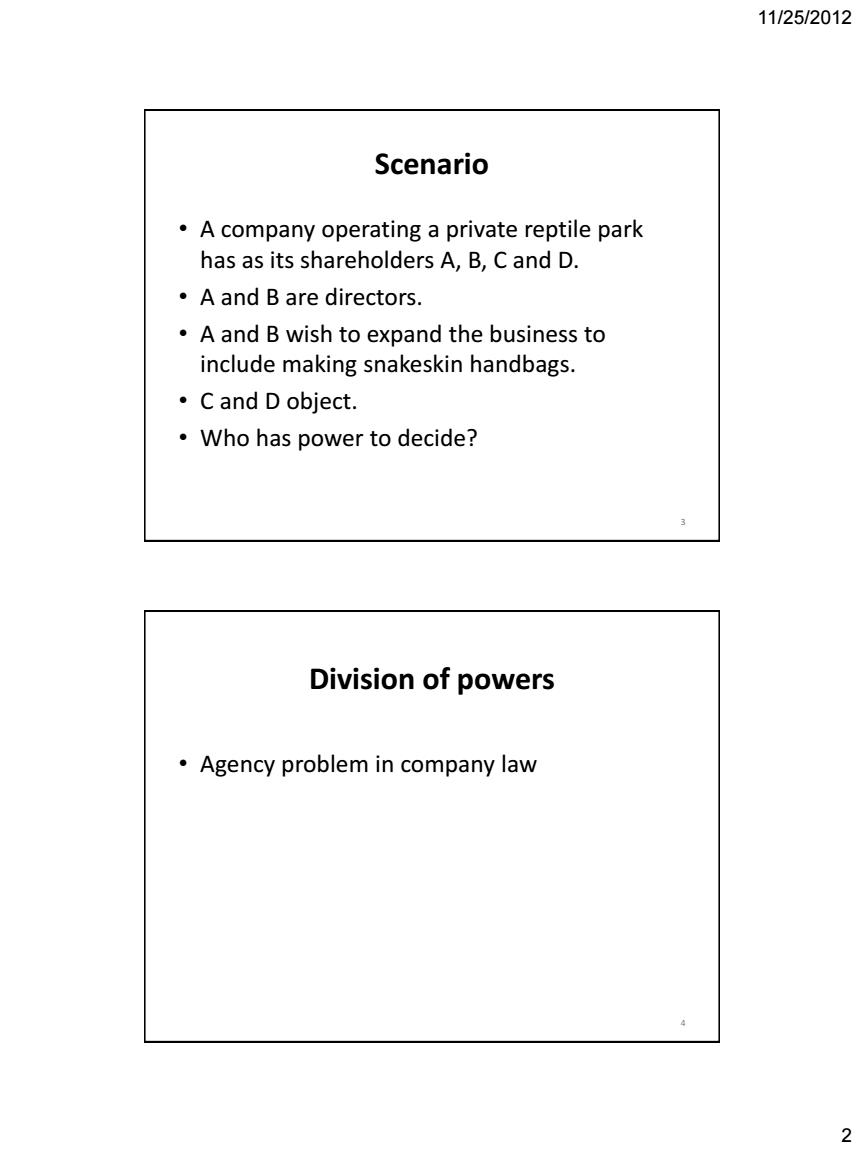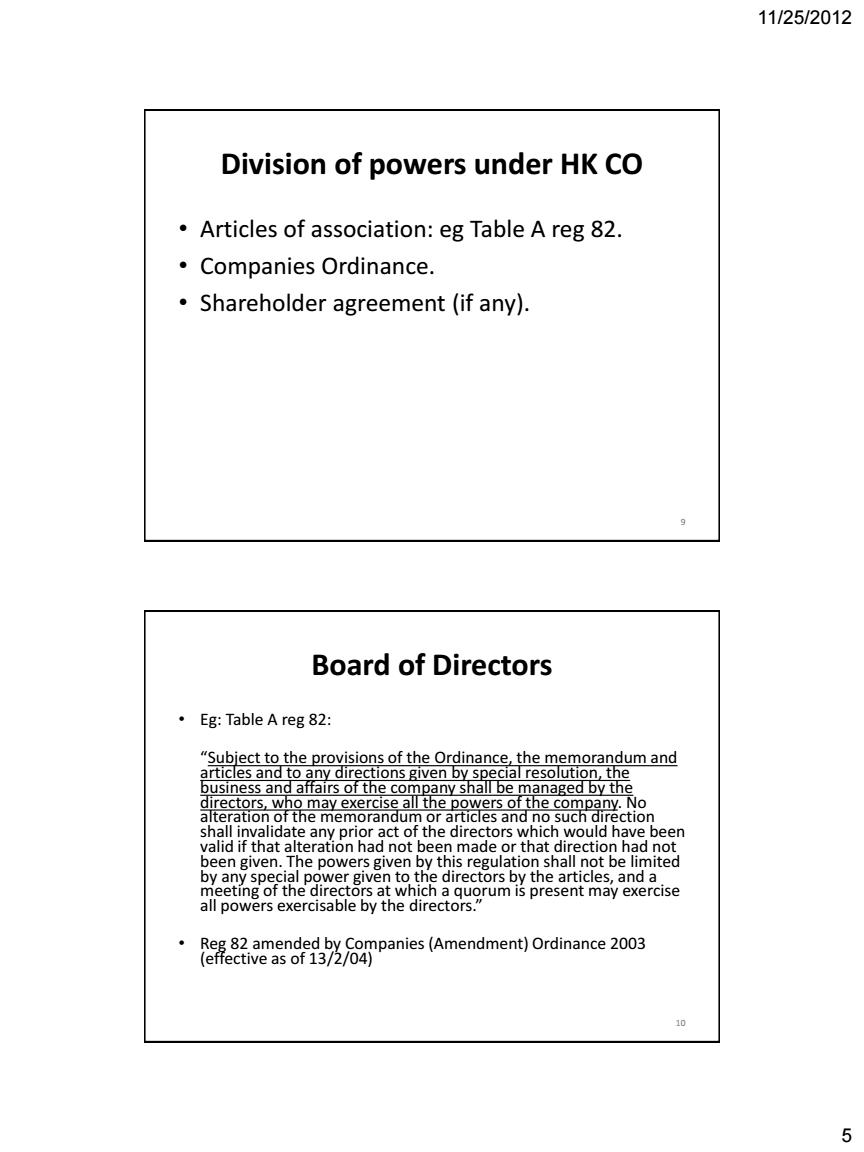
11/25/2012 Company Law I Lecture 7: Division of Corporate Powers Company is an artificial person Only acts through intermediary of humans natural persons 2 organs of the company: Board of Directors Members in General Meeting [how about management?] 1
11/25/2012 1 1 Company Law I Lecture 7: Division of Corporate Powers 2 Company is an artificial person • Only acts through intermediary of humans natural persons • 2 organs of the company: - Board of Directors - Members in General Meeting - [how about management?]

11/25/2012 Scenario A company operating a private reptile park has as its shareholders A,B,C and D. ·A and B are directors. A and B wish to expand the business to include making snakeskin handbags. ·C and D object.. Who has power to decide? Division of powers Agency problem in company law 2
11/25/2012 2 3 Scenario • A company operating a private reptile park has as its shareholders A, B, C and D. • A and B are directors. • A and B wish to expand the business to include making snakeskin handbags. • C and D object. • Who has power to decide? 4 Division of powers • Agency problem in company law

11/25/2012 Division of powers ·Decision rights Decision-making power o Instruction rights o Veto or approval rights >The size of the corporate action >The decision involves an investment type decision >The decision involves conflicts of interest Appointment and removal Shareholder v.director primacy Division of powers ·UK law(HK case law) .The originating power is held by members Members delegate power to the board based on articles Members can alter the initial distribution by altering the articles 3
11/25/2012 3 5 Division of powers • Decision rights Decision-making power o Instruction rights o Veto or approval rights The size of the corporate action The decision involves an investment type decision The decision involves conflicts of interest • Appointment and removal • Shareholder v. director primacy 6 Division of powers • UK law (HK case law) The originating power is held by members Members delegate power to the board based on articles Members can alter the initial distribution by altering the articles

11/25/2012 Division of powers ·US law(Delaware law The board's authority to manage co is provided by the Delaware General Corporation Law Default rule or mandatory rule?[rarely see amendments to this provision] Default position is set in favor of the board s/er approval right over the sale of assets which amount to "all or substantially all"of the assets s/er have no right to approve share issues and direct conflicts of interest [by board approval or court review] Board to appoint and delegate powers to executive directors .Obstacles to amending articles in order to re-distribute the board power:board resolution making a proposal majority s/ers vote Division of powers 。German law LLC Act and Stock Corporation Act .2 tiers of board:management board +supervisory board Management board may include members Supervisory board includes non-managerial members and outside directors(i.e.,union reps) Statutes [not s/ers]delegate powers to board .Statutes do not provide s/er approval right in relation to significant transactions Other decision rights for the s/er body:appointment of auditors, approval of payments to board members,measures relating to the raising of capital and issue of shares-more items can be added in articles but cannot invade the sphere of managerial authority given to the management board by the statutes 8 4
11/25/2012 4 7 Division of powers • US law (Delaware law) The board’s authority to manage co is provided by the Delaware General Corporation Law Default rule or mandatory rule? [rarely see amendments to this provision] Default position is set in favor of the board s/er approval right over the sale of assets which amount to “all or substantially all” of the assets s/er have no right to approve share issues and direct conflicts of interest [by board approval or court review] Board to appoint and delegate powers to executive directors Obstacles to amending articles in order to re-distribute the board power: board resolution making a proposal + majority s/ers vote 8 Division of powers • German law LLC Act and Stock Corporation Act 2 tiers of board: management board + supervisory board Management board may include members Supervisory board includes non-managerial members and outside directors (i.e., union reps) Statutes [not s/ers] delegate powers to board Statutes do not provide s/er approval right in relation to significant transactions Other decision rights for the s/er body: appointment of auditors, approval of payments to board members, measures relating to the raising of capital and issue of shares – more items can be added in articles but cannot invade the sphere of managerial authority given to the management board by the statutes

11/25/2012 Division of powers under HK CO Articles of association:eg Table A reg 82. Companies Ordinance. Shareholder agreement (if any) Board of Directors ·Eg:Table A reg82: "Subject to the provisions of the Ordinance,the memorandum and articles and to any directions given by special resolution,the business and affairs of the company shall be managed by the directors,who may exercise all the powers of the company.No alteration of the memorandum or articles and no such direction shall invalidate any prior act of the directors which would have been valid if that alteration had not been made or that direction had not been given.The powers given by this regulation shall not be limited by any special power given to the directors by the articles,and a meeting of the directors at which a quorum is present may exercise all powers exercisable by the directors." 。 Reg 82 amended by Companies(Amendment)Ordinance 2003 (effective as of 13/2/04) 10 6
11/25/2012 5 9 Division of powers under HK CO • Articles of association: eg Table A reg 82. • Companies Ordinance. • Shareholder agreement (if any). 10 Board of Directors • Eg: Table A reg 82: “Subject to the provisions of the Ordinance, the memorandum and articles and to any directions given by special resolution, the business and affairs of the company shall be managed by the directors, who may exercise all the powers of the company. No alteration of the memorandum or articles and no such direction shall invalidate any prior act of the directors which would have been valid if that alteration had not been made or that direction had not been given. The powers given by this regulation shall not be limited by any special power given to the directors by the articles, and a meeting of the directors at which a quorum is present may exercise all powers exercisable by the directors.” • Reg 82 amended by Companies (Amendment) Ordinance 2003 (effective as of 13/2/04)